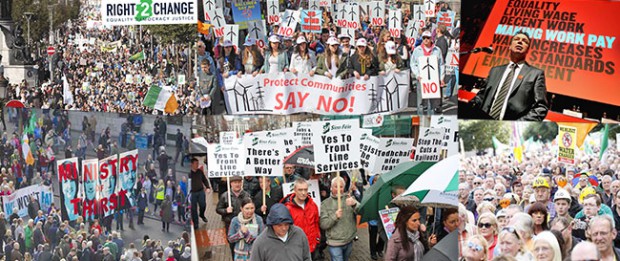5 January 2016 Edition
Agreement on a ‘Fair Recovery’ agenda would be a game-changer

• Maximum cross-community and sectoral solidarity against austerity is crucial
A positive axis against austerity, spearheaded by the regional executives of Scotland, Wales and the North of Ireland – supported by the British Labour Party, the Trades Union Congress in Britain, the Irish Congress of Trade Unions, Right2Change, and other civic stakeholders – would be a game-changer
CUTS TO PUBLIC SERVICES, job losses, dismantling of the welfare state, and political disregard for the special circumstances of the North are the distinctive hallmarks of the present British Government’s agenda.
This Tory doctrine is also being reinforced with levels of political authoritarianism not witnessed since the Thatcher er; and, ominously, an increased role for the British military and security establishment has become central to setting state policy.
The most pernicious byproduct of the Tory austerity and authoritarian agenda is the Trade Union Bill currently before the Westminster parliament.
On 10 December, the Scottish Trades Union Congress (STUC) hosted a high-profile demonstration of anti-austerity unity and support for workers’ rights at a public rally of 2,000 people in Glasgow involving Scottish First Minister Nicola Sturgeon, British Labour Party leader Jeremy Corbyn and Greek economist Yanis Varoufakis specifically focusing on the Trade Union Bill.
This important initiative typifies the type of cross-party solidarity required elsewhere to encourage popular opposition to the bad choices made by conservative and social democratic parties in Britain and Ireland which have inflicted greater hardship on ‘in work’ and ‘out of work’ families and citizens.
The previous week, the NI Committee-Irish Congress of Trades Unions (NIC-ICTU) set out its position on the Stormont House/‘Fresh Start’ Agreement.
It expressed the trade union movement’s support for the political institutions and the restoration of political stability in the North. It recognised that the British Government’s responsibility for the austerity crisis in the North contributed directly to the increased political instability in recent years and that the Irish Government has failed to live up to its responsibility as a co-guarantor for both the peace and political processes.
The trade unions also set out their concerns about economic and financial elements of the Agreement, including Corporation Tax and the Voluntary Exit Scheme.
The perspective of the trades union leadership in the North was also set out again in an Irish News interview on 16 December.
Importantly, the NIC-ICTU position paper outlined a number of constructive strategic proposals which can contribute to the restructuring of the regional economy and help limit the imposition of austerity by encouraging economic growth and a fair recovery.
Sinn Féin will be meeting with NIC-ICTU in early January to discuss its proposals. The party is committed to a sustained engagement with NIC-ICTU on these ideas and would encourage all political parties and other sectors of civic society to do likewise.

• The SNP's Nicola Sturgeon, British Labour Party leader Jeremy Corbyn and Greek economist Yanis Varoufakis
The political institutions need to be a bulwark against Tory austerity in the Six Counties.
It is essential that the local political parties, trade unions and other key civic stakeholders are united in continuing to make the case for the North’s ‘special circumstances’ emerging from conflict.
The election of a majority Conservative Party government in Britain and the implications of that have changed everything for the North, so the regional economic and social policy paradigm must now also be changed.
That means effectively targeting patterns of inequality and the under-investment and economic underdevelopment west as well as east of the Bann.
The Six Counties Civil Service and its investment, job-creation and enterprise agencies have not produced the programmes required to deliver economic and social change which all sections of the community can enjoy. The old system has failed in this respect because it was never designed to succeed. That’s why the process of economic policy and decision-making must be changed.
The local trade union movement – and the other civic stakeholders, including the business and employers’ organisations – should be closely involved in helping to shape future manufacturing, industrial, investment and training policy and strategies for the North.
Consideration should be given to the formation of a properly constituted economic and social consultative body which ensures these key stakeholders have a real role in the future development of regional policy and strategy.
This would represent one way to ensure that the political institutions act as a brake on the Tories’ efforts to impose unchecked austerity.
Sinn Féin is already committed to working closely with the trade unions and other sectors in the North and across the island to oppose austerity and build support for a fair recovery.
The success of that, however, will depend upon mobilising maximum political and social solidarity. Political sectarianism or opportunism from the negative Left and within some sections of social democracy makes no constructive contribution to securing that objective.

Right2Change has emphasised the importance of common ground and alliances in the 26 Counties. Maximum cross-community and sectoral solidarity against the austerity crisis in the North is also crucial.
The damage being done to the welfare state, public services, jobs and working conditions by the Tories transcends constitutional, community and civic differences.
A ‘Fair Recovery’ agenda should be common ground for civic society and progressive parties across Ireland and Britain. The regional executives of Scotland, Wales and the North of Ireland should now provide joint political leadership on the importance of maximum solidarity and co-ordinated opposition to austerity by the trade union congresses, churches, and regional businesses, employers and voluntary organisations.
The example set by the STUC in hosting its Glasgow meeting could be replicated with a similar initiative in Belfast.
A positive axis against austerity, spearheaded by the regional executives of Scotland, Wales and the North of Ireland – supported by the British Labour Party, the various TUCs in Britain, the Irish Congress of Trade Unions, Right2Change, and other civic stakeholders – would be a game-changer.
This would represent a powerful challenge to the negative status quo which is ascendant in Britain and Ireland.
It could be the catalyst for a new progressive roadmap.




